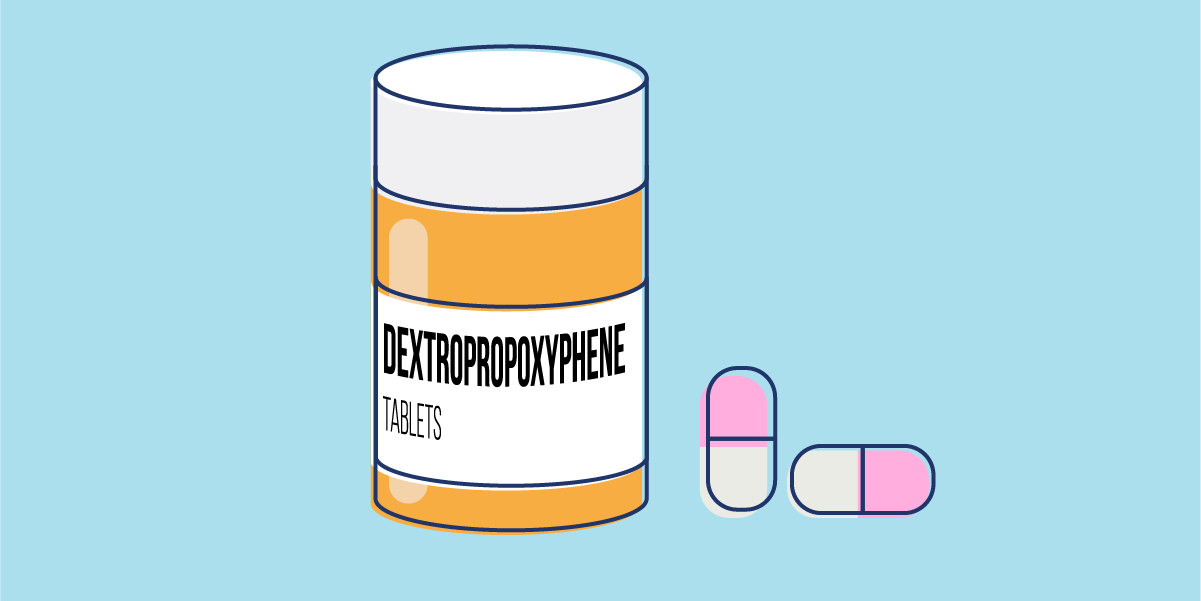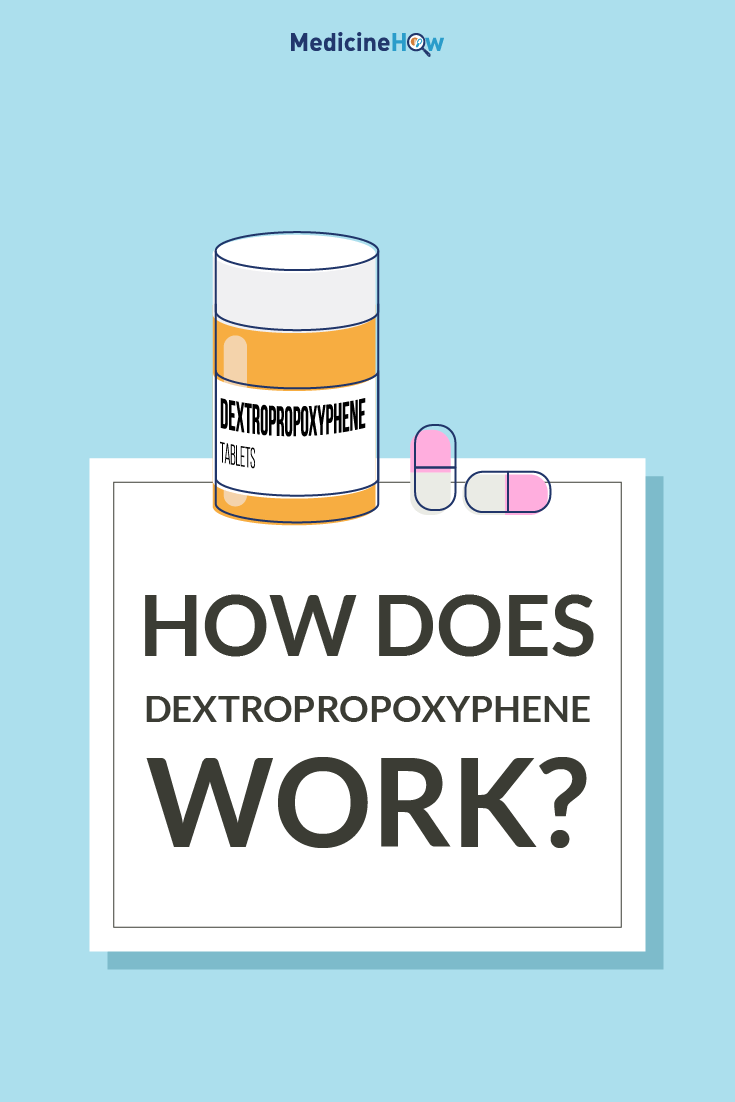
Dextropropoxyphene, also known as propoxyphene, is a type of drug called an opioid that works by activating opioid receptors that naturally exist in your body. This has a number of effects on your body, including to provide analgesia and relieve pain, which is what it is used for. It is most often recommended for mild to moderate pain.
Brand Names and Doses
Dextropropoxyphene is the generic name, which is the name of the actual drug component inside the medication. The main brand is called Doloxene, which contains 100 mg of dextropropoxyphene napsate in each capsule.
There are also several other brand name medications that include dextropropoxyphene in combination with other medications. These include:
- Di-Gesic tablets: 32.5 mg of dextropropoxyphene with 325 mg of paracetamol
- Paradex tablets: 32.5 mg of dextropropoxyphene with hydrochloride and 325 mg of paracetamol
- Capadex capsules: 32.5 mg of dextropropoxyphene with hydrochloride and 325 mg of paracetamol
What type of drug is it?
Dextropropoxyphene is a type of drug called an opioid. This is a drug class that helps us to group drugs that work in a similar way together. Other opioid medications include:
Dextropropoxyphene should not be used in high doses because it can be very toxic. You body changes the drug, or metabolizes it, to form a substance nordextropropoxyphene which can be toxic for your heart. It is no longer recommended for use at all in some countries for this reason.
What is Propoxyphene used for?
Propoxyphene may be used to help relieve mild to moderate pain. However, it is not significantly more effective than other medications that are associated with less side effects, such as paracetamol, so it is rarely used.
It is not recommended for more severe pain because high doses increase the risk of the cardiotoxic metabolite, nordextropropoxyphene, building up in the body.
How does Dextropropoxylene work?
Everyone naturally has endogenous opioids inside their body, which can bind to special receptors, called opioid receptors, to activate several effects in the body. When an endogenous opioid attaches to the right receptor, it can lead to:
- Analgesia to relieve pain
- Slowing down of breathing
- Feeling tired
- Difficulty defecating
Dextropropoxyphene manipulates this natural process by activating the same receptors that the endogenous opioids do. It mimics the effect of natural opioids in your body.
Dextropropoxyphene can also decrease the transmission of pain impulses in the body by interrupting the pain messages in the spinal cord and interfering with the messages coming from the brain in the central nervous system (CNS).
Side Effects
There are several general side effects of opioid medications such as dextropropoxyphene that can affect some people, such as:
- Drowsiness
- Dizziness
- Headache
- Dry mouth
- Infrequent urination
People taking dextropropoxyphene may also experience some changes in the conduction of the heart, such as a prolonged QT interval.
You can find out more information about some of the specific side effects by clicking on them below.
Nausea
Constipation
Respiratory Depression
Dependence
Cautions
There are some serious safety concerns about the use of dextropropoxylene, which have caused it to be removed from the market in several areas of the world, including Europe and the United States of America.
In particular, if the drug accumulates in the body due to high doses, your body can convert it into a substance called nodextropropoxylene, which can prolong the QT interval and be toxic for your heart.
There are also some people who may need special attention if they take dextropropoxylene due to other medications or health conditions they have. For example, if you have the following conditions often you may need a lower dose than usual:
- Slow heart rate
- Endocrine disease
- Hypothyroidism
- Adrenocortical insufficiency
- Myasthenia gravis
- Central nervos system (CNS) depression
- Frequent use of alcohol
Additionally, people with epilepsy are more likely to have a seizure while taking dextropropoxylene, so this should be considered.
Special Cases
People who are elderly often require a lower dose of dextropropoxylene than other adults.
This is because their body takes longer to process the drug, so the concentration in the bloodstream builds up more quickly. As a result, elderly people are more likely to experience side effects, such as cognitive impairment, sedation and respiratory depression. They may also be at risk for having a fall.
Interactions
Taking dextropropoxylene at the same time as another drug can sometimes change their effect on your body because of the way they interact.
When combined with carbemazepine or ritonavir, the concentration of these drugs in your body is higher than usual, so your are more likely to experience side effects. This can be managed by reducing the dose of carbemazepine or ritonavir.
All drugs that cause your breathing to slow down can increase the risk of a serious side effect of fentanyl: respiratory depression. Many drugs to lower blood pressure, such as beta blockers, can have this effect. This combination can be used, but it's important that your doctor knows that you are taking dextropropoxylene and checks that the dose is right for your body.
Some drugs that are used in the treatment of depression called selective seretonin reuptake inhibitors (SSRIs) can cause a condition called seretonin toxicity. The risk of this is higher if dextropropoxylene is taken at the same time, so you need to be on the lookout for early signs.
Pregnancy and Breastfeeding
Dextropropoxyphene is not usually recommended for pregnant women because your baby is more likely to have respiratory depression, which can be fatal. Additionally, they may experience withdrawal effects when they are born and no longer get the dose from your blood stream.
Instead, it is usually best for pregnant women to take other medications to relieve pain while they are pregnant, such as paracetamol.
For women who are breastfeeding, occasional doses of dextropropoxyphene are thought to be safe. However, their may be some risk to your baby if they are used every day for an extended period of time.
Pin it!


